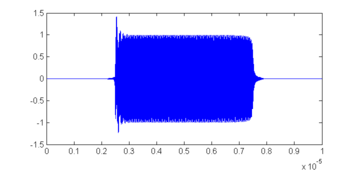Radiofrequency pulse
From NMR Wiki
| Line 6: | Line 6: | ||
Notice that edges of the pulse are not perfect. There is an oscillation of amplitude in the beginning and a somewhat gradual falloff at the end of the pulse. Typically such transient imperfections on the modern hardware are or the order of ~100 ns (nanosecond is 10<sup>-9</sup> seconds) | Notice that edges of the pulse are not perfect. There is an oscillation of amplitude in the beginning and a somewhat gradual falloff at the end of the pulse. Typically such transient imperfections on the modern hardware are or the order of ~100 ns (nanosecond is 10<sup>-9</sup> seconds) | ||
| - | The "inner" portion of the pulse is filled with the radio-frequency oscillation. That frequency in the NMR literature is called "carrier frequency" and is most often kept constant throughout the experiment (however hardware allows re-setting that frequency during the course of the pules sequence) | + | The "inner" portion of the pulse is filled with the radio-frequency oscillation. That frequency in the NMR literature is called "carrier frequency" and is most often kept constant throughout the experiment (however hardware allows re-setting that frequency during the course of the pules sequence). |
[[Image:Square-pulse.png|356px]] | [[Image:Square-pulse.png|356px]] | ||
Revision as of 23:27, 7 December 2009
Radiofrequency pulse or "RF pulse" is a temporary burst of radio waves.
Duration of that burst is called "pulse width", typically abbreviated as PW.
Below is an approximate image of a realistic square 5μs long pulse. Notice that edges of the pulse are not perfect. There is an oscillation of amplitude in the beginning and a somewhat gradual falloff at the end of the pulse. Typically such transient imperfections on the modern hardware are or the order of ~100 ns (nanosecond is 10-9 seconds)
The "inner" portion of the pulse is filled with the radio-frequency oscillation. That frequency in the NMR literature is called "carrier frequency" and is most often kept constant throughout the experiment (however hardware allows re-setting that frequency during the course of the pules sequence).
Strength of the pulse is more commonly measured in Hertz as 1/(4*PW90), where PW90 is the duration of 90o pulse at the same power.


